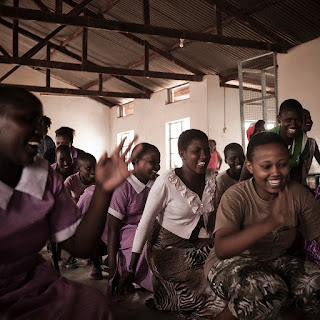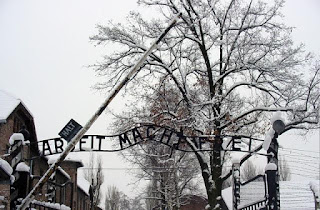Women of the Maasai fight back for their daughters
 |
| Photo Simona Ghizzoni |
Kajiado (Kenya) - “The Maasai society denies girls an
education: they prefer to send male children to school…” A cell phone rings
interrupting Faith in mid sentence. It’s an emergency that the small woman with
tightly braided cornrows is used to tackling, cool headedly and quickly. “A
girl has just been cut: the ceremony is happening right now, but we don’t know
where exactly” she says as she listens to her informant, while trying to figure
out the precise location in the savannah she will send a delegation of women
and a police escort to help the victim and denounce those responsible.
“Aren’t you
going, Faith?”
“No, it’s safer if they don’t know my face,” she
smiles, “otherwise I wouldn’t be able to travel around the villages anymore.”
In Elangata Wuas, a settlement in the Kajiado County
in southern Kenya, 80 kilometres from Nairobi, everyone is familiar at least
with Faith Mpoke’s name. In this 13 thousand people community overshadowed by
the Odonyio hills, she is known as the “different” Maasai: a scandalously
independent woman to some; an extraordinary example to follow to others. She is
33 years old, has a son and has been working with ActionAid international NGO
since 2011. Every morning, from the gloomy town of Kajiado, she sets out in a
jeep heading towards the steep, barren, dirt roads that lead to the thorny
bushes enclosing the Enkangs,
the camps with round,
poorly lit, mud huts, and tries to persuade her people that it’s time to look
towards the future. And the future, in the land of the Maasai pastoralists,
begins with renouncing traditions that herald disease, maternal-infant
mortality, ignorance and poverty. Such
as female genital mutilation (FGM). “I underwent it, too,” Faith admits in a
faint voice. “But my mother was a teacher and she fought for me to be able to
complete my school education. This is an issue that is still taboo in my
family: they disapprove of me and find me shameless because I talk about it and
take my decisions without asking my husband’s permission.”
In Kenya, according to the Unicef’s 2016
FGM prevalence report, 21% of women have felt the blade on their
vaginas. The national prevalence varies within the more than 40 ethnic groups
present in the country, and in the Maasai society (around 2% of the population)
it reaches 73%. The semi-nomadic cattle herders, obstinately devoted to a
patriarchal social system, impose the ormurunya,
a traditional knife, on 10-11 year-old girls that entails the removal of the
clitoris and the labia minora. Emuatare - the Maasai word for female circumcision –
is less ferocious than the infibulation typically carried out in the Horn of
Africa, which concludes with sewing the vagina closed, but it still disfigures
a woman’s body condemning it to haemorrhages, infections, and complications
during childbirth due to the scarce elasticity of tissues. It also denies women
sexual pleasure so that wives remain monogamous and submissive. “But that’s not
all,” adds Faith Mpoke. “Emuatare is
the root of female illiteracy and early marriages: a cut girl is considered to
be a woman, thus forced to leave school to get married to an older man who
offers the girl’s family a dowry in cattle, their most valued good”.
The “cut” is unrelated to religion, which for the
Maasai is a syncretism of Lutheran Christianity and the cult of the ruthless
god Enkai. Emuatare is rather an
indisputable social norm that marks the passage from childhood to adulthood:
“If you get pregnant before circumcision,” Faith points out, “you are branded
as an Entaapai, a slut, and no
obstetrician will assist you during childbirth.”
According to the Ministry of Health’s 2014 Demographic and Health Survey
(DHS), prevalence of the cut has
decreased 20% among the Maasai in Kenya since 2003, but the struggle towards women’s
liberation is still rough around the edges. Yet Kenya is considered a champion
in the battle against female genital mutilation in Sub-Saharan Africa: since
2003, FGM prevalence dropped by 16% nationally, and the report “Demographic Perspectives on Female
Genital Mutilation” released in 2015 by the United Nations Population Fund
(UNFPA) estimates a further decrease of 40% by 2020. There are two
strict laws being enforced: the latest one, passed in 2011, foresees up to
three years imprisonment for cutters as well as sentences for those who
discriminate against women who are not cut. A government anti-FGM Commission
was established in 2011 and since 2014 a national prosecution unit has
investigated cases throughout Kenya to enforce the law. But within the confines
of the Maasai Enkangs, the only supreme
law is sanctioned by the elders following the path of the tradition.
“Many people organize ceremonies secretly,” reveals
Konina Tarayia, 50, the chair of the local Women’s Network at Elangata Wuas.
There are dozens of women members, of all ages, with short-cropped hair and
huge, dangling earrings of coloured beads. They trudge on foot for kilometres
to meet under the shade of the acacia tree outside the ActionAid office to
discuss women’s rights and social issues. “We have suffered genital mutilation for
too long,” continues Konina. “We want to spare our daughters and nieces from
the pain. Once, a girl died from haemorrhaging: we women protested and her
parents were arrested, but the cutter escaped.”
In two years, these relentless women, who mingle serious
meetings with songs, dances and irresistible laughters, have convinced many
families to keep their daughters intact. They visit schools to talk about
women’s rights; they invent role-play games and even involve into the battle
former cutters, who until recently earned 20 dollars a day to sharpen their
knives. Like Kimuntet Kaise who, leaning against her hut under the sweltering
afternoon sun, tells how good she was at healing the wound by covering it with
a paste of cow manure. Until one day she saw her niece die: “I was shocked,”
she confesses, “so I quit this job. The women helped me and now I sell wood to
schools.” Ester Oseur buried her ormurunya
knife long ago and she is proud to have physically struck “mothers and fathers
who wanted to circumcise their daughters. The Women’s Network gives us courage:
we are many and we are strong, no one dares attack us.”
“The Maasai society is male dominated: women don’t
have a voice and they don’t have property rights,” clarifies Faith Mpoke, who
actually founded the Women’s Network at Elangata Wuas. “These women have seized
their place in the community and carry out an excellent work at raising
awareness about the effects of FGM. They get fathers, husbands, and local
leaders involved and explain that the only way the entire society will make
progress is to send girls to school.” Julius Rotiken, an influential elder in
one of the villages, is one of these “feminist males”. “My uncle did not have
his daughters circumcised and I saw how they were healthier and did better at
school,” he says. “Unfortunately, there are few men here who see things as I
do.”
Lucy Yepe Itore is very familiar with the ferocious
reprisals of the Maasai men. Vice Principal of the school in Il Bissil, not far
from Kajiado, two months ago she made room in the dormitories for 20 girls
taken from their families to rescue them from genital mutilation and early
marriages. There isn’t a day that goes by when the Moran’s, the young Maasai
warriors, arrive at the gate wielding sticks and demanding the return of their
young girls. “They threaten me. I had to hire guards,” Lucy, a matronly woman
who is not afraid of anything, says as she bursts out laughing. Like Faith
Mpoke, she receives emergency calls from her “spies” in the camps and leaves on
expeditions during the night to save girls. “In another rescue centre, we
accommodated 130 girls,” she explains. “Some of them have since become nurses,
one works for an international NGO and travels around the world. I am convinced
that by allowing girls to study and further their education, we’ll be able to
turn around not only their destinies but our people’s destiny as well.”
Sukuta is 9 years old, the youngest girl at the rescue
centre in Il Bissil: she has a bright, sweet face and her eyes burst with
curiosity. She looks much different from when she first arrived, traumatized
and in terrible pain. She had been married for three months to a man as old as
her grandfather who had bought her innocence with a dowry of five cows. “I
would like to meet her parents and try for reconciliation,” whispers Lucy
Itore. “But they haven’t answered. Many parents, once their daughters have
settled here, say: ‘That’s it, she is no longer my daughter’. Very sad
stories.”
Irene is only 13 but she’s already a mother. Lucy’s
sentinels found her segregated at home. “All she was asking for was to continue
going to school. Her grandmother is now taking care of her child.” Irene wants
to talk about herself, but tears, weighty and paralyzing, flow over her words. Soila,
also 13, ran away from two marriages and she sings us a song: “I sang it softly
to myself to give me the strength to get through the worst times.”
To cover the education costs of the 20 fugitives (but
their number may have doubled as we are writing), Lucy Itore organizes
long-distance adoption through ActionAid. “All they own is their shuka, the Maasai blanket they were
wearing when we saved them. They need everything.”
In the school-yard, watching them play with the water
gushing out of the well, singing in a ring around the rosie, laughing loudly in their pink
school uniforms, you can’t help but think they have already won the battle
against that cruel legacy that was trying to rip their childhood to shreds.
UNCUT is a multimedia project by Emanuela Zuccalà. It has been
developed with the support of the “Innovation in Development Reporting Grant Program”
of the European Journalism Centre (EJC),
funded by the Bill & Melinda Gates Foundation, and carried out in partnership
with ActionAid NGO and the cultural association Zona.
-->
The complete web documentary at
this link: uncutproject.org
From Mail & Guardian (South Africa), 8 July 2016


Commenti
Posta un commento